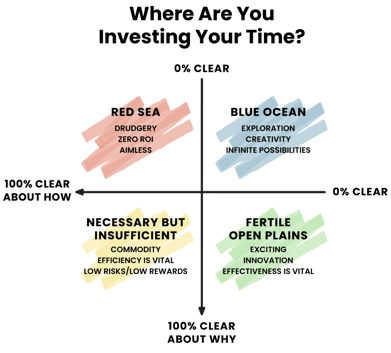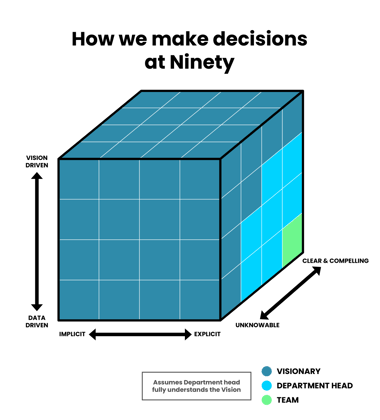Reaching the Winner's Corner: Explicit, Coherent, and Resonant
Over the years, I’ve become a huge believer in the power of simple models, frameworks, and mental models. The best of them provide immense utility, which is incredibly relatable when the big idea is conveyed visually. And the best of the best? Those are the ones that stay with you. The following are three such frameworks that have stayed with me.
The first graphic concerns what it takes to create a great culture. In short, everything important to organizational culture must be explicit, coherent, and resonant to individuals, teams, and everyone. This means that every team member who’s been with the organization for at least six months should fundamentally understand who we are as a company, people, and tribe.
![Winners Corner Cube [Hand Drawn]](https://www.ninety.io/hs-fs/hubfs/chub_backup/Winners%20Corner%20Cube%20%5BHand%20Drawn%5D.png?width=500&height=381&name=Winners%20Corner%20Cube%20%5BHand%20Drawn%5D.png)
At Ninety, we developed Focus Filters to frame the essential components of who we are. They include:
- Core Values
- Compelling Why
- Compelling and Audacious Goals
- Industry and niche
- Ideal Customer
- Compelling Value Proposition
- 3-year goals
- 1-year goals
- 90-day goals
- Org Chart
- Core Processes
We share a guide called On Ninety with every prospective team member that explains our Focus Filters and why they’re essential. We also encourage them to read my Trust Series, and, once hired, our onboarding process includes deeper dives into the Focus Filters, concepts, tools, and disciplines composing Ninety.
This essential reading is vital to enhancing our team members’ learning curve and ensuring they fully understand how we provide value and make decisions — two interconnected factors that the second and third graphics below help illustrate.
Explaining how we provide value and make decisions at the company may seem like a simple (if not obvious) step. However, we’ve sometimes struggled to help team members fully grasp both. In light of the great care we take in our onboarding process and the transfer of critical information to all team members, the challenge is still very real and will intensify as we continue to grow and add new team members every month.

We’re a vision-driven company with a relatively complex vision, at that. In fact, it’s taken some of our senior leaders many months to fully appreciate our vision, even though most everyone believed it to be pretty clear from the start. The truth is, it just takes time to know — explicitly — why we care about things as deeply as we do. Another truth: Because of the time this takes, I’m reluctant to cede control (on some things) as swiftly as most of my direct reports would like.
Just the other day, for example, I asked several members of my Senior Leadership Team to name our two Compelling and Audacious Goals and why they are so important. Most could not. It’s not that they don’t care. Just the opposite, actually, as they’ve consistently shown they care deeply by expertly handling a heavy volume of work. It just takes time to fully appreciate what we are doing when you’re balancing all of that, and it’s why I continue to be involved in certain decisions.
This tension is especially apparent in a software company where members of the product and engineering teams often come from organizations that subscribe to data-driven, Agile methodologies.
I understand and fully respect Agile, but I sincerely believe that vision-light, data-driven companies inevitably end up chasing efficiencies and competing primarily on price. This can prevent such companies from playing the long game because they’re always looking at the data driven by the marketplace, which only reflects the current competition.
In short, data-driven strategies are built on the past (that’s where data comes from) and inevitably lead to overweighting efficiency versus effectiveness. On the other hand, great companies are forward-thinking. They’re about where a market is going, not where the market is now. In other words, great companies hold fast to their vision.
This is especially important to remember as team members go about their daily work. When heads are down working on only the tasks at hand, it’s challenging to reach those “green oceans” of opportunity. This is why leaders must connect their teams’ day-to-day tasks with the broader vision. Otherwise, it’s all too easy for team members to only see the task right before them – the “what,” so to speak – instead of connecting with the “why.”
As Steve Jobs shared:
“People don’t know what they want until you show it to them. Our task is to read things that aren’t yet on the page.”
That’s a powerful perspective, one which leads me to this last model…

The big idea is that great companies start as a business built on a vision for what their target market will be in at least 5–10 years. The vision must be explicit and compelling not just to align the organization around its Focus Filters, but in terms of the initial products and services... and how they will likely evolve.
This doesn’t mean a founder needs to be 100% right about the vision, but they must be pretty confident before they get to work. Because thereafter, the vision is likely to evolve. That’s an important distinction; while our Vision's “Northern Constellation” remains the same, we’re bound to learn the best approaches along the way. But we never lose sight of that Northern Constellation. My experience strongly suggests that companies that lose their vision are destined to move from providing something unique and special to delivering a commodity. Great companies, just like life itself, must evolve to remain great.
Just as significantly, the best of the best don’t just evolve their products and services. They also evolve at the leadership level, establishing continuity to remain in that Winner’s Corner. One visionary passes the baton to another who appreciates that which is unique and special about the company — respecting and defending the Focus Filters for as long as appropriate — while also having their own five-to-ten-year vision that is explicit, coherent, and resonates with all the company’s Ideal Stakeholders.
Does your vision align with this thinking?
Subscribe to my Founder's Framework newsletter to discover how successful founders leverage proven frameworks to build thriving companies they’ll love forever.





